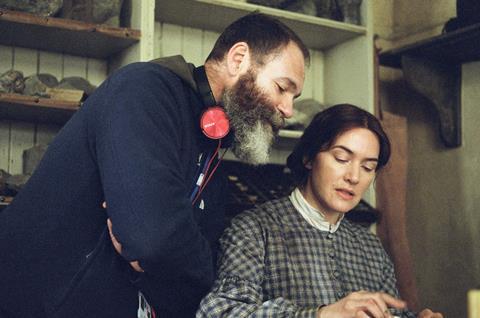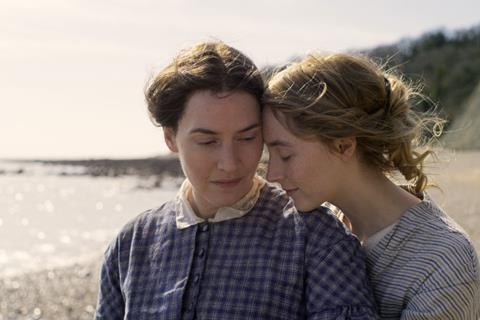With Ammonite, Francis Lee set out to make a film that elevated its working-class subject, real-life 19th-century fossil hunter Mary Anning.

Back in 2013, when Francis Lee’s agent Charlotte Knight at Knight Hall sent out his God’s Own Country debut feature screenplay to potential producer partners, the actor-turned-filmmaker clocked up plenty of meetings. “Everybody said how much they loved my writing and this story was really great, but what else did I have?” recalls Lee. “I kept saying, ‘But I want to make this,’ and nobody would do that.”
Following the critical, commercial and awards success for that contemporary gay love story, which premiered at the 2017 Sundance Film Festival (where Lee won best director in the World Cinema — Dramatic section) before going on to gross £868,000 (more than $1m) at the UK box office for Picturehouse Entertainment, producers started singing a different tune. “I would meet them and they would say, ‘What do you want to do?’”
The answer to that question, Lee decided, was an 1840s-set story about Mary Anning: a woman born into poverty who made her living digging out fossils from the beaches and cliff faces of Lyme Regis on England’s south coast, and selling them to collectors and tourists. “Through self-knowledge, Mary rose to being what we would now call one of the leading palaeontologists of her generation,” says the filmmaker. “And she was totally unrecognised because she was a woman and because she was working class. All of those things started to fire my interest — the things I generally obsess about are class, landscape, survival, extraordinary people.”
After God’s Own Country’s Sundance premiere, Lee met with Iain Canning of See-Saw Films, who expressed a strong desire to make his next feature — whatever it might be. Later that year, Lee pitched him Ammonite, and Canning was sold.
The BFI — where Lee had had a good experience working with film fund executive Mary Burke on God’s Own Country — signed on to develop Ammonite, with Lee working again with his regular script editor Anna Seifert-Speck. Ammonite is a BBC Films and BFI presentation of a See-Saw Films production, with See-Saw’s Cross City Films selling multiple territories (including Lionsgate for the UK) prior to the seven-week shoot from March to May 2019 in Dorset, Kent, Surrey and London. Neon acquired Ammonite for the US in January 2020 for a rumoured $3m deal. The budget was “under £10m”, according to See-Saw.
Canning, who produces alongside his See-Saw partner Emile Sherman, advocated that they pull in a third producer, and Lee suggested Fodhla Cronin O’Reilly, who had impressed him while they were respectively developing God’s Own Country and Lady Macbeth through Creative England’s iFeatures scheme.
Star power

When it came to casting Mary Anning, Lee was looking for a gifted actress of course, and the part called for her to be British and in her 40s. But that was not all. “I wanted to work with somebody who was, in a sense, a movie star; I wanted to do everything I could do for Mary Anning to elevate her,” explains Lee. Kate Winslet, who is now aged 44, offered the whole package. “I had been drawn to Kate because I always felt whatever she did, there was an honesty. And I thought that we might get along and she might want to come towards me, and work in the way in which I like to work.”
Winslet read the screenplay and agreed to play the role the same day, also agreeing to Lee’s intense preparatory process. “It’s always in the gift of the actor, because it’s very rare you have money to pay actors before they come on to the prep before the shoot,” says Lee. “We worked for about three months on building the character. We built who she was and what her experiences were and what she knew. Kate wanted to investigate it all, not just emotionally but also physically. We went to Lyme Regis and Kate started to fossil with an expert down there. All the things that Mary would do, Kate learned, and then in the film she did for real.”
Opposite Winslet, Lee cast Saoirse Ronan in the role of Charlotte — the wife of rich fossil collector Roderick Murchison (James McArdle). Lee discovered the existence of this real-life couple who knew Mary, and also that Charlotte had been left in Lyme Regis by her husband for a period.
“I took that idea and I ran with it,” he says. “The other thing that I obsess about is intimate human relationships, and I thought very hard about who I could suggest Mary might have had a relationship with, because there is no evidence of that. The only evidence is she had friendships with women. And I thought that making her have a relationship with a man in a patriarchal society where women are subjects of men, it didn’t feel right.
“I wanted to elevate her and I wanted to give her a relationship that felt respectful and worthy of her,” he continues. “And that to me felt like a woman, because they could operate within an equality. And because of my obsession with class — and Mary was very working class — I wanted to look at an upper-class woman.”
Set in stone
Having been selected for the Cannes 2020 label in June, Ammonite will receive its public premiere as a Gala screening at the part-physical, part-virtual Toronto International Film Festival — but international filmmakers will not be travelling, because of the Covid-19 pandemic.
“To be selected for Cannes, and then Telluride, and then Toronto feels like an extraordinary experience, and I feel really humbled and honoured by it,” says Lee. “And it’s frustrating and disappointing not to experience the interaction around the film at those events and meet other filmmakers. But also, in this time when people are dying and people are very sick, it feels churlish to sit with my disappointment. So it does feel very odd.”

























No comments yet